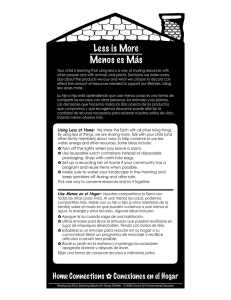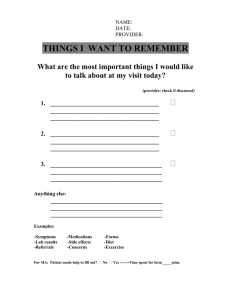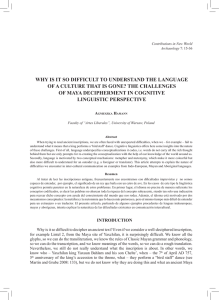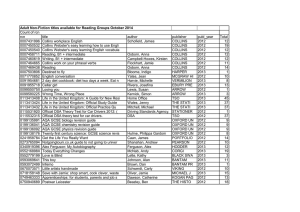Edexcel Viva Translation Workbook Complete Sample
Anuncio
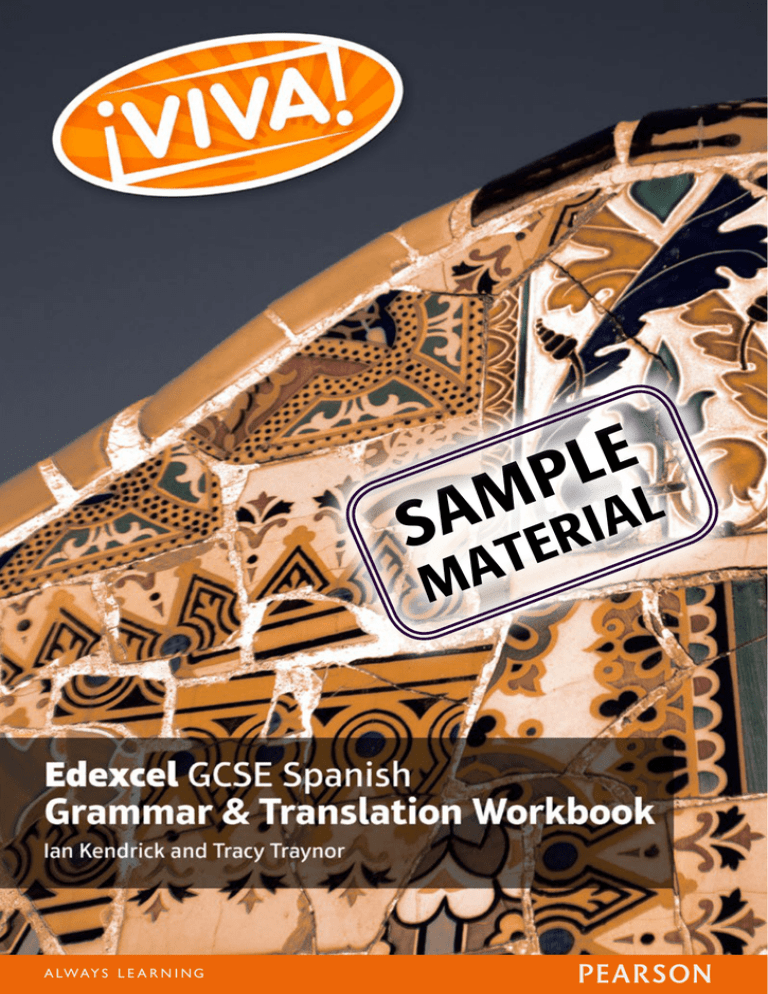
E L P M L A A I S ER T A M A LW AY S L E A R N I N G Adjectives G Superlatives Foundation p. 160 Higher pp. 32–33 You use superlatives to compare two or more things and say that one is the best, worst, cleverest, most/least (interesting). Regular superlatives In Spanish, most superlatives are formed like this: el/la/los/las más + adjective the most… el/la/los/las menos + adjective the least… In the superlative form, the adjective agrees with the noun being described. Estos coches son los más pequeños. These cars are the smallest. When the superlative is used with a noun, the noun goes before más / menos. La tecnología es la asignatura menos interesante. Technology is the least interesting subject. Irregular superlatives Some superlatives are irregular. They change form to agree with plural nouns and the noun goes aer mejor, mejor, etc. T F singular plural English meaning el/la mejor los/las mejores the best el/la peor los/las peores the worst el/la mayor los/las mayores the oldest, the biggest el/la menor los/las menores the youngest A R Escuché las mejores canciones. I listened to the best songs. songs. To give a context (e.g. ‘the best in the class’,’, ‘the oldest in the world’), world’), you use de. de. They’re the oldest in the class. Son los mayores de la clase. H Absolute superlatives Use the absolute lute superlative when you want to say something is really nice or extremely expensive. To form the absolute superlative, you add –ísimo to the end of the adjective, and make it agree. Es facilísimo. It’s really easy. facilísimo.. facilísimo If the adjective ends in a vowel, you remove it before adding the ending. gambas están buenísimas. buenísimas.. buenísimas Estas gambas These prawns are extremely good. D masculine singular feminine singular masculine plural feminine plural English meaning altísimo altísim o really/very/extremely tall 1 altísimos altísim altísima altísim a altísimos Complete the sentences using the words from the box. el famoso menos más mayor 1 La educación física es fácil: es la asignatura 2 Sus amigos son los más 3 Es el campo de fútbol más divertidos difícil. . de España. 4 Tengo tres hermanas, pero soy la . 5 No me gusta la química porque es la asignatura 6 Mi profesor de dibujo es 2 complicada. mejor. Unjumble the words in brackets to complete the sentences. 1 Me gusta hacer natación. Es (le mjroe) deporte. 2 Javier tiene muchos amigos. Es el chico (smá cibaosle) de mi grupo. 3 Gael lee mucho. Es el alumno (áms letniitegne) de la clase. 4 Su profesora es paciente. Es la profe (snome versea) del insti. 16 We are seeking endorsement for use with the Edexcel GCSE (9-1) Spanish specification, currently subject to accreditation by Ofqual. ¡Viva! GCSE Spanish © Pearson Education Limited 2016 Adjectives H 3 Teresa Teatrera is a drama queen! Circle the adjectives and rewrite the text for her, changing them to absolute superlatives. El domingo fui a la playa de Barcelona, ¡fue estupendo! Primero comí unas gambas y unas patatas bravas ricas. Luego fui al puerto, donde vi unos barcos grandes, ¡era precioso! Después saqué fotos de las casas viejas del Barrio Gótico y compré una camiseta cara en la tienda. Y ahora ¡estoy cansada! 4 T F Finish the sentences with your own answers and translate into English. En mi opinión… 1 El deporte más emocionante es… 2 El mejor destino de vacaciones es… A R 3 La asignatura menos interesante es… 5 Translate these sentences into Spanish. D 1 I saw the most interesting museums. 2 She wants to buy the longest necklace. 3 I am the youngest in my family. H 6 To keep the hard ‘c’ sound, ric– changes to riqu– in the absolute superlative. Remember to look carefully at verbs and use the correct tense! Think carefully about word order. Look back at the grammar box, if you need to. Translate the passage into Spanish. Last winter I went to New York. It was really interesting! I visited the best shops and I bought the most expensive presents. Central Park is the prettiest park in the city. On Tuesday, my sister and I went to the Metropolitan Museum where we saw the most famous paintings. It was the best holiday of my life! To give a context like this, use the correct form of de. ¡Viva! GCSE Spanish © Pearson Education Limited 2016 Singular or plural? We are seeking endorsement for use with the Edexcel GCSE (9-1) Spanish specification, currently subject to accreditation by Ofqual. 17 Translation: Spanish – English Identity and Culture 1a Read this text about the pop group Kiko and Shara. This word in Spanish needs multiple words in English. Kiko y Shara son un dúo musical y son hermanos. Nacieron en Cádiz en el sur de España. Kiko es muy guapo y es más alto que su hermana. Lleva barba. Shara tiene el pelo más largo que su hermano y es muy simpática y optimista. Llevar normally translates as ‘to wear’, but here you will need to choose a word that works with ‘beard’. You will need to remember how to translate comparatives with this phrase. b Translate the following words into English. 1 nacieron 3 guapo 2 sur 4 barba 5 pelo T F 6 simpática Remember that near cognates can help you translate words. For example, optimista means ‘optimistic’ in English. c Now translate the whole text into English. A R 2a Read this text about Manú and social networks. D Mis amigos y yo usamos Instagram para compartir fotos porque es muy fácil de usar. Uso Spotify porque es la mejor aplicación para descargar la música que me gusta. A mi madre le encanta usar Skype. Ayer habló con su padre que vive en Estados Unidos. b Someone has translated the passage but has made mistakes. Correct the errors in bold. photos because it is free My friends and I use Instagram to download to use. I use Spotify because it is a good I like. My mother likes app to share using Skype. She talked to her parents lives in the United Kingdom 3 . Now translate the following passage into English. Tengo muchos pasatiempos porque soy muy deportista. Hago footing todos los días. La semana pasada hice equitación con mi mejor amigo. El jueves que viene, voy a jugar al baloncesto con mi equipo y ¡vamos a ganar! 100 music that We are seeking endorsement for use with the Edexcel GCSE (9-1) Spanish specification, currently subject to accreditation by Ofqual. who Look carefully at verb endings to work out which tense you need in English, but don’t forget that some irregular verbs won’t follow the patterns! ¡Viva! GCSE Spanish © Pearson Education Limited 2016 Translation: Spanish – English H 4a Read this text about the festival El Correfoc. El Correfoc se celebra en otoño en Cataluña. Muchas personas se disfrazan de demonios y desfilan por las calles corriendo, bailando y saltando entre fuegos artificiales. Algunas personas, sobre todo los padres, se han quejado de esta tradición porque dicen que es muy peligrosa. Las autoridades harían más para proteger a sus hijos pero tienen cada vez menos dinero para la seguridad. H b Now complete this translation of the text by filling in the gaps. in Correfoc is devils and the the streets . Some people, because it is in Catalonia. Many people , dancing and 5 about this tradition . The authorities more to . T F Now translate these passages into English. 1 Ricky Martin es un buen modelo a seguir ya que lucha contra la pobreza y por los derechos de los homosexuales. Además, ha hablado abiertamente de su sexualidad, inspirando a muchos jóvenes. Ha hecho mucho para combatir la injusticia y quiere que el matrimonio gay sea legal en su propio país. A R D H 2 as between parents, but they have H Check the tense of each verb by looking carefully at the ending. Read your translation back to make sure that it is logical and makes sense. Don’t forget to check your grammar, spellings and punctuation in English too! La paella es el plato más conocido de España pero si preguntaras a muchos españoles no sabrían su origen. La paella fue inventada hace mucho tiempo por la gente que vivía en el campo y sigue siendo popular en los hogares españoles. Además, podemos comerla en todos los sitios turísticos de España. H 3 Mi amiga Lucía fue de compras, ya que sus parientes le regalaron mil euros para su cumpleaños. A Lucía le encanta estar a la moda, y por eso se compró un anillo que era muy caro. Lucía había gastado un montón de dinero cuando salió de la joyería. Me dijo que cuando tenga dieciocho años pedirá más dinero. ¡Viva! GCSE Spanish © Pearson Education Limited 2016 We are seeking endorsement for use with the Edexcel GCSE (9-1) Spanish specification, currently subject to accreditation by Ofqual. 101 Typeset by Tek-Art, West Sussex. Original illustrations © Pearson Education Limited 2016. Illustrated by Tek-Art, Beehive Illustration, KJA artists, Oxford Designers & Illustrators and John Hallett. Picture Credits Cover images: Front: Alamy Images: Kevin George Find out more and order your free Edexcel GCSE (9-1) Spanish Evaluation Pack www.pearsonschools.co.uk/vivaedexcel2016amp V095c Pearson Ltd is committed to reducing its impact on the environment by using responsibly sourced and recycled paper.
